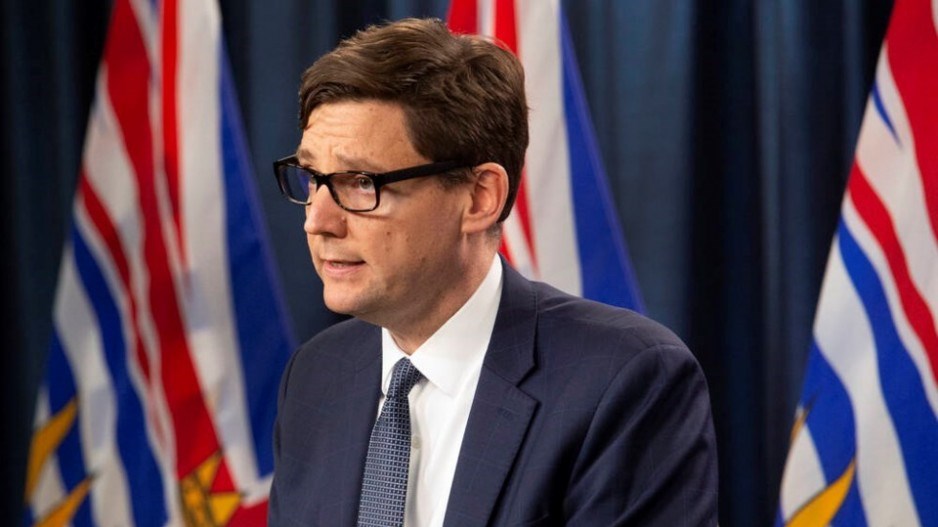You have to give Premier David Eby credit: When he decides to go big on an issue, he goes freakishly big. In just four weeks, the premier has tabled five bills that have dramatically reshaped the issue of housing in British Columbia, from building, buying or renting a home.
The latest was Wednesday, with legislation that will make it mandatory for municipalities to approve dense multi-story housing, such as condo towers, around Skytrain stations, bus exchanges and other transit hubs.
“We are taking action to deliver more homes for people so we can get homes built faster (and) transit-oriented is one critical way of making sure we get those homes built,” said Housing Minister Ravi Kahlon.
“It's good for people, it's good for communities, and it makes the most of the transit infrastructure and the services that people need in our communities.”
In Metro Vancouver, the change means condo towers of up to 20 storeys are automatically approved directly beside Skytrain stations. Municipalities can’t reject them — though, if they want, they can approve even higher towers than the provincial maximum.
The transit reforms cap an extraordinary run on housing, quarterbacked by the premier. He’s banned most Airbnb-styleshort-term rentals, eliminated single family zoning, quashed public rezoning hearings and redesigned community amenity funding — all in under a month. Plus, he’s taken significant stabs at making it easier to clear homeless encampments from public parks, and tweaked the residential tenancy branch.
The scope and breadth of the change is extraordinary. But it didn’t come out of nowhere. It took 12 months for Eby to turn his NDP leadership campaign promises on housing, and his 100-day action plan after becoming premier, into legislation ready for the floor of the house.
All told, the half dozen or so bills set the NDP up to promise almost 300,000 new housing units. Some, like 16,000 units freed up by limiting Airbnb-style rentals to principal residences, will depend on how the market responds.
But the 100,000 new condo and townhouses the province expects to be built around transit hubs are more directly within government’s control.
Transportation Minister Rob Fleming said he has earmarked $400 million to acquire land around future Skytrainterminals and transit hubs, which will give the government first crack at developing affordable housing in those key locations rather than leaving it to private speculators to build expensive condos.
The province is also compiling an inventory of unused land it holds near highways and key transportation corridors that could be converted to housing under the new higher density rules.
Still, some skepticism is warranted.
BC United leader Kevin Falcon pointed out the NDP promised 114,000 new housing units upon taking power in 2017 and have only actually built 16,000.
“They've been in power for seven years — granted it took seven years before they started to come up with even more ideas on how they're going to fix the problem, but I'm here to tell you someone that has spent many, many years in the housing sector, that these won't work,” Falcon said Wednesday.
Falcon gave Eby credit for taking a bold swing at the housing crisis, but said he’s tabled the wrong solutions.
“A year out from an election, now they're just throwing spaghetti at the wall hoping that something sticks,” he said.
The NDP’s reforms do share a common theme: Overriding municipal governments. Each bill has given the province more power to push local politicians out of the housing approval process, with the intent to speed up construction.
Some find this an egregious trampling of municipal authority. Others are happy to redirect all those angry not-in-my-backyard protesters over to the provincial government and nearest NDP MLA.
The transit legislation is the last bill in the fall session to target housing.
But one of Eby’s largest reforms is still to come. He has billions set aside for a new BC Builds program in the spring. The province will bring together all the elements so far into a provincial building program, using public land and new fast-tracked approvals, to construct affordable housing only available to British Columbia residents.
The BC Builds program will likely be the biggest component yet in Eby’s housing plan. And that’s saying something.
“We’re in a housing crisis every single day,” Kahlon said Wednesday.
“We have to meet the moment. We know that there's a need for housing, we have to do things differently. We have to reform our processes on how we make decisions, how we capture dollars for infrastructure, and how we make decisions about housing in our communities. And that's what the work that we're doing here.”
We’ve never seen a government target any particular sector or problem with this many new laws, this quickly. Even if it fails to work, you can’t blame the premier for lack of ambition or intent.
Rob Shaw has spent more than 15 years covering B.C. politics, now reporting for CHEK News and writing for Glacier Media. He is the co-author of the national bestselling book A Matter of Confidence, host of the weekly podcast Political Capital, and a regular guest on CBC Radio. [email protected]




